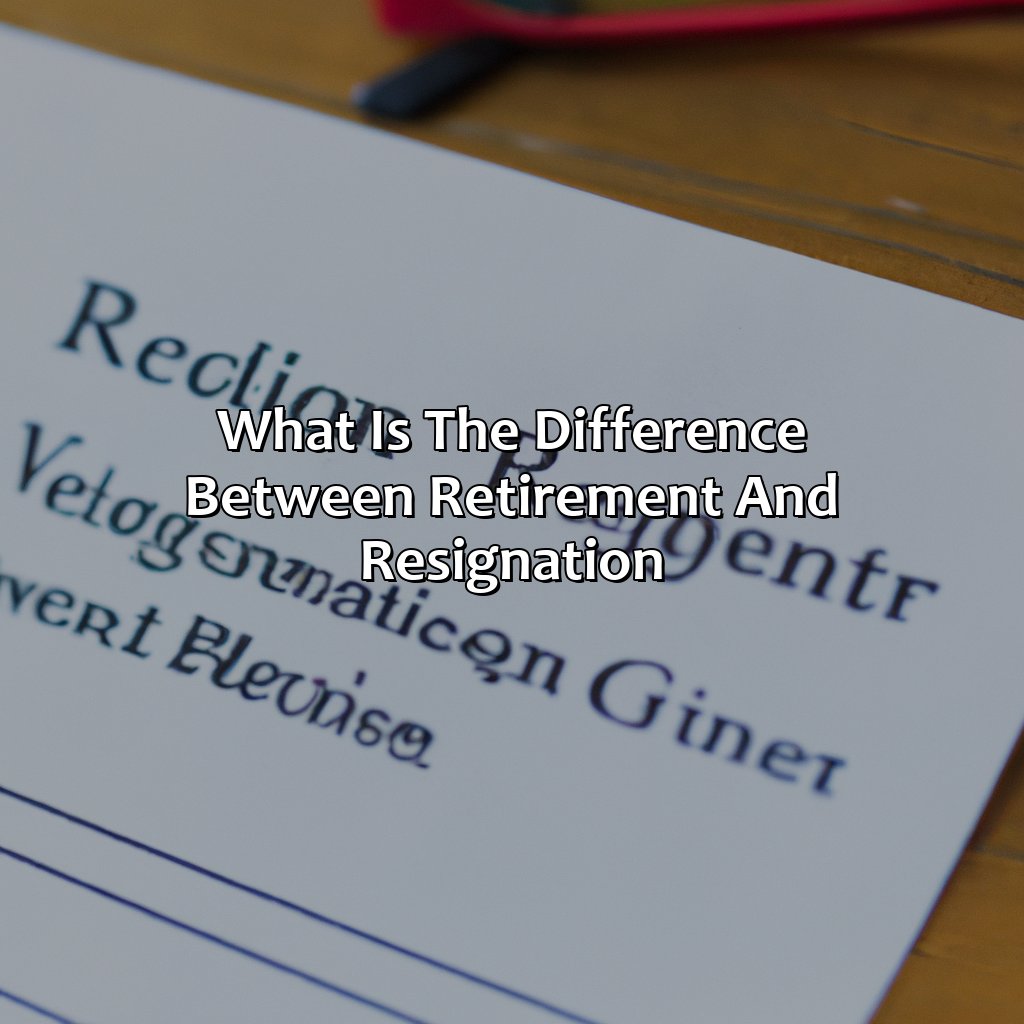What Is The Difference Between Retirement And Resignation?
Key Takeaways:
- Retirement and resignation are two different ways of leaving a job, with retirement being a planned exit due to reaching a certain age or milestone, while resignation is a voluntary decision to leave the job for personal or professional reasons.
- The main differences between retirement and resignation include the reason for leaving, eligibility for benefits, and financial implications, as retirement benefits are generally more favorable and long-term planning is required.
- However, both retirement and resignation require a notice period, may involve exit interviews, and can have an impact on future employment opportunities. It is important to carefully consider the factors and seek professional advice when making this decision.
Are you confused about the difference between retirement and resignation? When the time comes for you to leave the workforce, it is important you understand the differences between these two processes so you can make the right decision. You will learn exactly what each term means and how they differ in this article.
Retirement and Resignation Defined
Retirement and resignation are two ways employees can choose to leave their job. Retirement involves voluntarily ending one’s career after reaching a certain age or meeting specific eligibility requirements for retirement benefits. Resignation is leaving a job voluntarily for personal reasons, such as a new opportunity or dissatisfaction with the current position. It’s essential to understand the differences between the two, as they have distinct legal, financial, and emotional implications.
Retirement is a planned departure from the workforce, usually after reaching a certain age or completing a specific number of years of service. It’s common for retirement to come with benefits like pensions, 401(k) plans, and healthcare coverage. Resignation, on the other hand, is a voluntary departure from the job, and usually happens when an employee finds a new job, starts their own business or wishes to take a break from work. There are typically no benefits associated with resigning from a job.
It’s essential to consider the financial implications of both retirement and resignation when making the decision. Retirement often comes with a fixed income and benefits, offering financial security. Resignation, however, can lead to a period of uncertainty with no guaranteed income, which can be a significant risk.
Interestingly, the concept of retirement is a relatively new one. Before the 20th century, people worked until they were physically unable to do so. The concept of retirement was introduced as part of the Social Security Act in 1935, aimed at providing relief for elderly workers who were struggling economically. Since then, retirement has become a standard part of many peoples’ lives, whereas resignation remains a common option for those who want to pursue new opportunities or take a break from work.
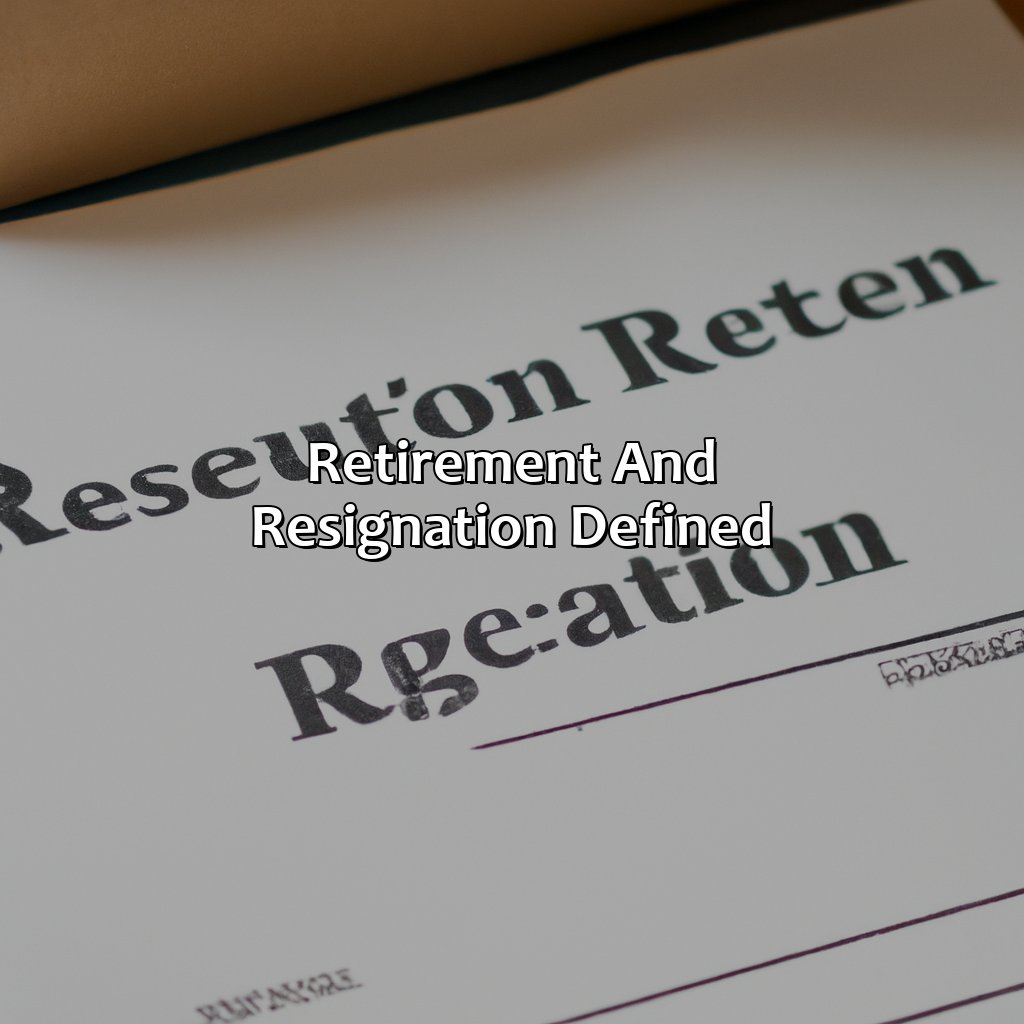
Image credits: retiregenz.com by Joel Arnold
Differences Between Retirement and Resignation
In the corporate world, it is vital to understand the differences between Retirement and Resignation. Retirement refers to the stage of leaving one’s job due to old age, whereas resignation is leaving the job due to personal reasons. Here’s a detailed comparison of the two concepts without any jargon or buzzwords.
A Table showcasing “Retirement” and “Resignation” columns could assist in understanding the comparison better. The Retirement column would cover the following fields:
- A specific age limit is mandated
- Retirement receives full benefits and pension
- Retirement is after years of service
The Resignation column would include the following details:
- Can resign at any age
- Not entitled to full benefits or pensions
- Resignation could be due to various reasons
Moving further, people who retire usually have plans to enjoy their life and take a break, whereas, in resignation, individuals move towards a different career or may have to take a break to handle some personal issues. It’s often observed that many retirees take part-time jobs or pursue hobbies, while those who resign do it to fulfill a more significant or specific goal in their career or personal life.
Pro Tip: Before deciding to retire or resign, one should carefully assess the pros and cons of each and consider all the options available. It’s essential to consider the long-term impacts of the decision.
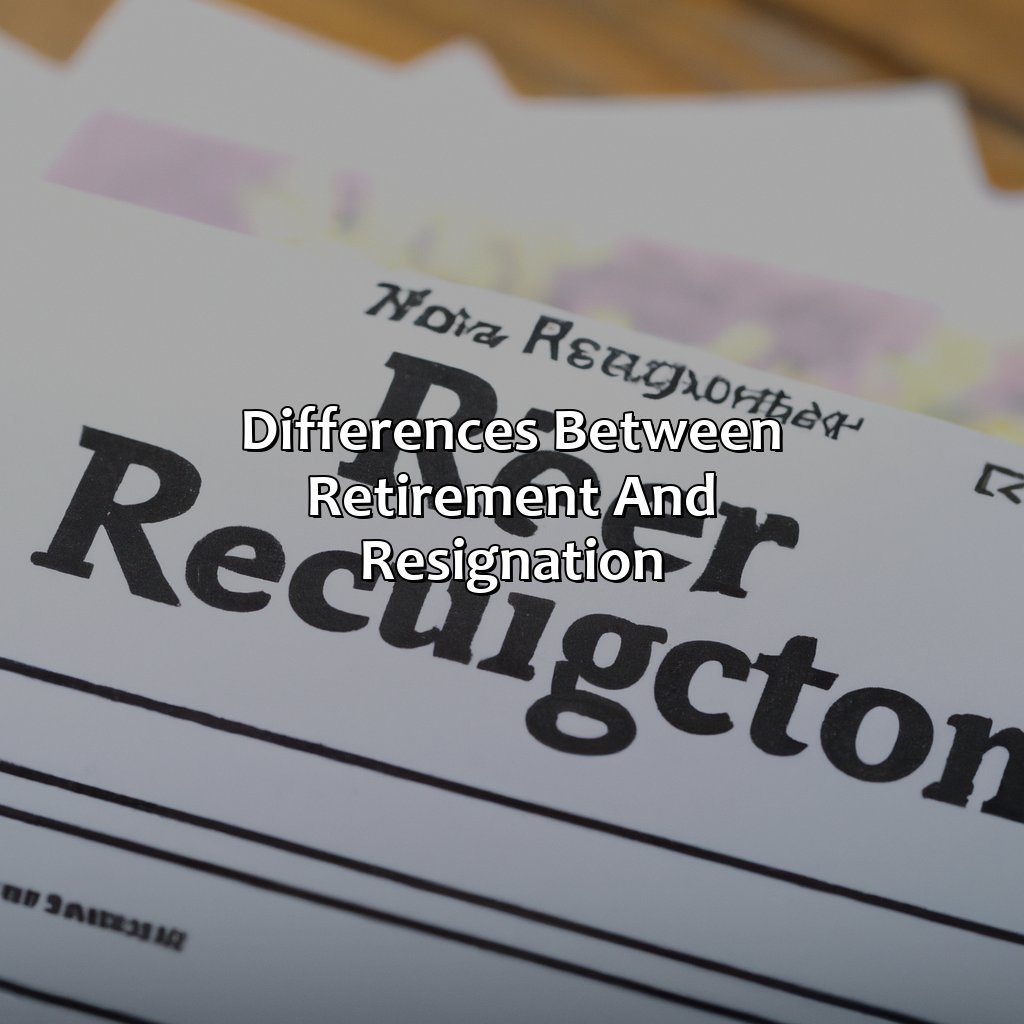
Image credits: retiregenz.com by Joel Jones
Similarities Between Retirement and Resignation
In comparing Retirement and Resignation, there are several similarities that can be drawn between these two events. Retirement and Resignation both involve the decision to leave a job, either permanently or at a specific point in time. The decision may be voluntary or involuntary, and often involves some sort of transition period. Here are some of the similarities:
- Both Retirement and Resignation involve the termination of employment.
- They may both involve giving notice of leaving the job.
- Both may create new opportunities for growth and change in an individual’s life.
- They often involve transitioning out of one role and into another, whether that be retirement or a new job.
- Both involve making a decision about one’s future career path and life goals.
- Retirement and Resignation give employers a chance to fill an open position or hire a new employee.
In addition to these similarities, there are unique details that differentiate Retirement and Resignation from one another. Retirement is usually associated with a particular age or eligibility to receive a pension or other retirement benefits, while Resignation can occur at any point in a person’s career. Retirement also typically involves a permanent separation from the workforce, while Resignation may result in a temporary or permanent separation.
Interestingly, Retirement and Resignation have a long history in the workforce. Retirement as we know it today was first introduced as a concept in the late 1800s, and was initially only available to government employees. It wasn’t until the 1930s that private companies began offering retirement benefits to their employees. Resignation, on the other hand, has been a common occurrence in the workforce since it was first established in the early days of employment. It has become more common in recent years as people transition between jobs more frequently.
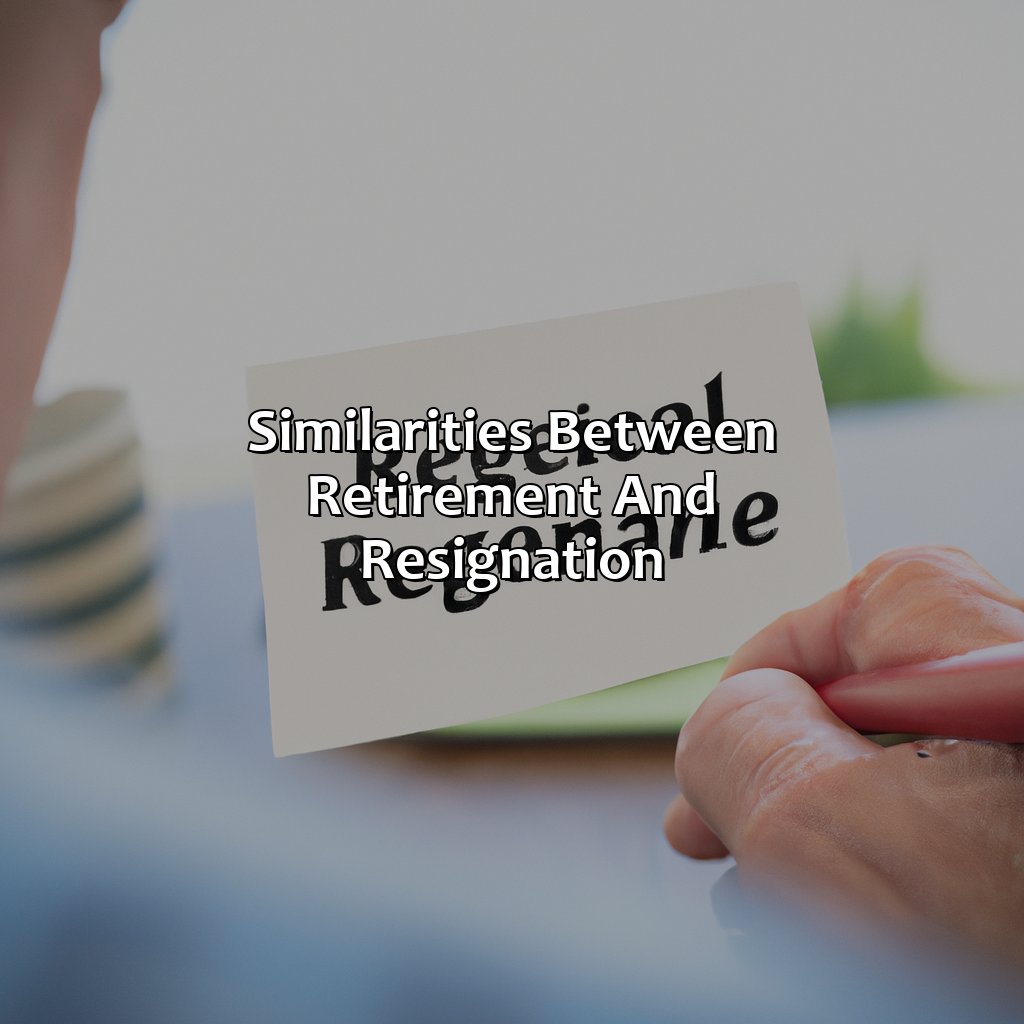
Image credits: retiregenz.com by Yuval Jones
Choosing Between Retirement and Resignation
Retirement and resignation are two distinct concepts that individuals need to choose from depending on their circumstances. Retirement implies that the person is withdrawing from work and will no longer be employed, whereas resignation means that the person is voluntarily leaving their job.
Age and personal goals are two factors that determine whether someone chooses retirement or resignation. Retirement may be a better choice for those who are close to retirement age or have reached their desired financial goals, while resignation may be more appropriate for those who want to pursue alternative career paths and challenges. It is essential to weigh the benefits and drawbacks of each option, such as pension benefits and job stability for retirement and the potential for personal and professional growth for resignation.
It is also crucial to consider the impact of leaving a job on one’s personal and professional life, such as the financial consequences and loss of social connections. Therefore, one must plan carefully and make informed decisions before choosing between retirement and resignation. The decision can be influenced by several factors such as current employment status, career goals, health, and financial situation, among others.
No matter the individual’s decision, it is essential to approach the process with a positive attitude and a clear vision of the future. Consider seeking advice from professionals or those who have experienced the same situation to ensure that the decision is well-informed. Ultimately, a well-thought-out decision will bring peace of mind and a sense of direction for the future.
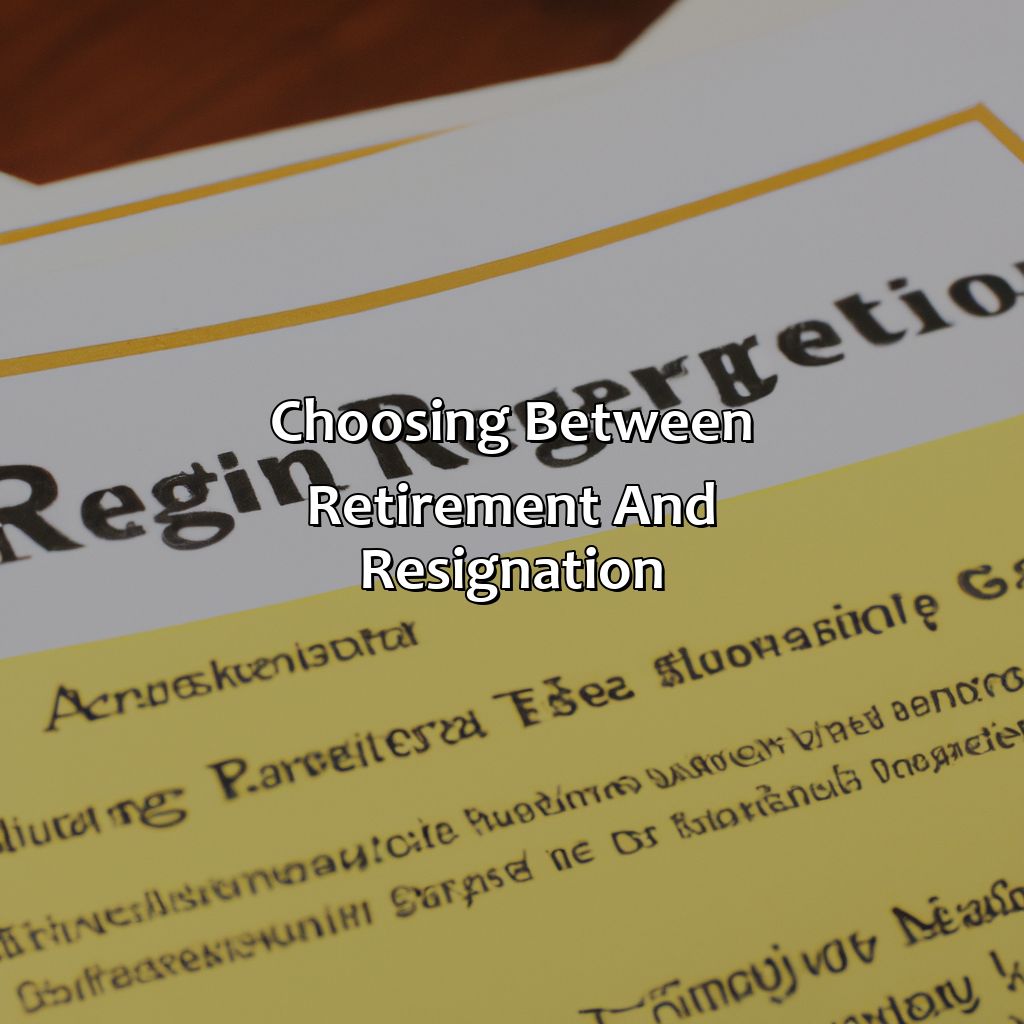
Image credits: retiregenz.com by James Washington
Five Facts About Retirement vs. Resignation:
Retirement is a voluntary decision to stop working permanently after reaching a certain age or meeting certain requirements, while resignation is a decision to leave a job voluntarily for personal or professional reasons at any age. (Source: The Balance Careers)
Retirement usually involves receiving retirement benefits, such as pensions, while resignation does not. (Source: Investopedia)
Retirement is often viewed as a positive milestone in one’s life, while resignation can have mixed feelings or negative connotations, such as being fired or quitting without a plan. (Source: Forbes)
Retirement can have tax implications and may require additional financial planning for retirement income, while resignation may not have the same financial implications. (Source: SmartAsset)
Retirement may involve transitioning to a different lifestyle, such as traveling or pursuing hobbies, while resignation often involves finding new employment opportunities. (Source: Kiplinger)
FAQs about What Is The Difference Between Retirement And Resignation?
What is the difference between retirement and resignation?
Retirement is when an employee voluntarily ends their working career in order to enjoy their time off without any obligation of work. Resignation is when an employee voluntarily quits their job for personal reasons.
What are the benefits of retirement?
The benefits of retirement include the opportunity to rest and enjoy the fruits of your labour, the ability to travel or engage in hobbies and the ability to spend time with loved ones without the pressures of work.
When should I retire?
The retirement age varies depending on the country and organization. However, the average age of retirement is between 60 to 65 years. It also depends on your financial readiness, health, and personal goals.
Can I retire early?
Yes, an employee can retire early as long as their financial situation permits it. Early retirement can come with some financial and social downsides, such as reduced retirement benefits and social support.
What is the best way to save for retirement?
The best way to save for retirement is by investing regularly in a retirement savings account such as an IRA or 401(k). Save as much as you can and start early to give your investments more time to grow. Consult with financial experts to help you achieve your retirement goals.
What happens to my retirement when I resign?
If an employee resigns before their retirement age they will not receive their full retirement benefits. However, some companies provide the option of cashing out retirement funds or transferring the funds to another retirement savings account.
 Checkout this IRS Loophole
Checkout this IRS Loophole 
